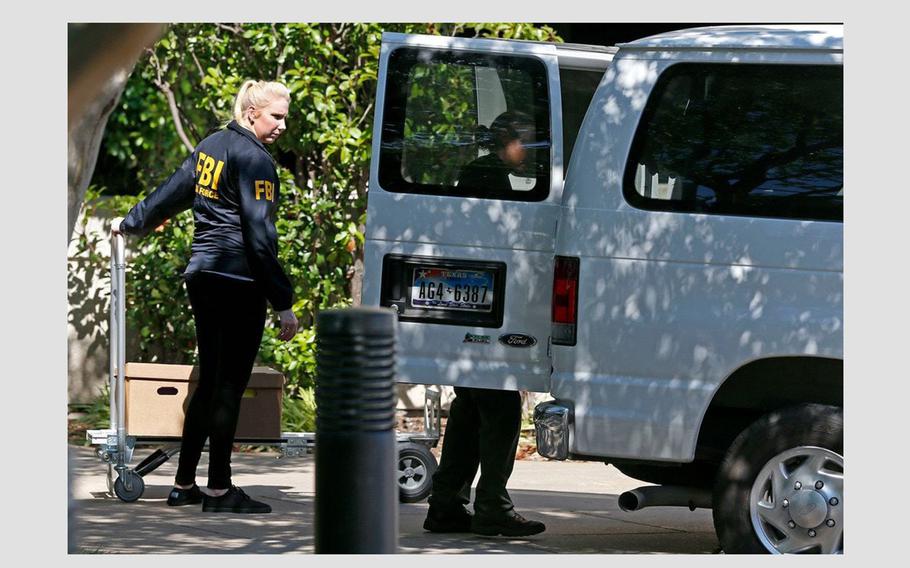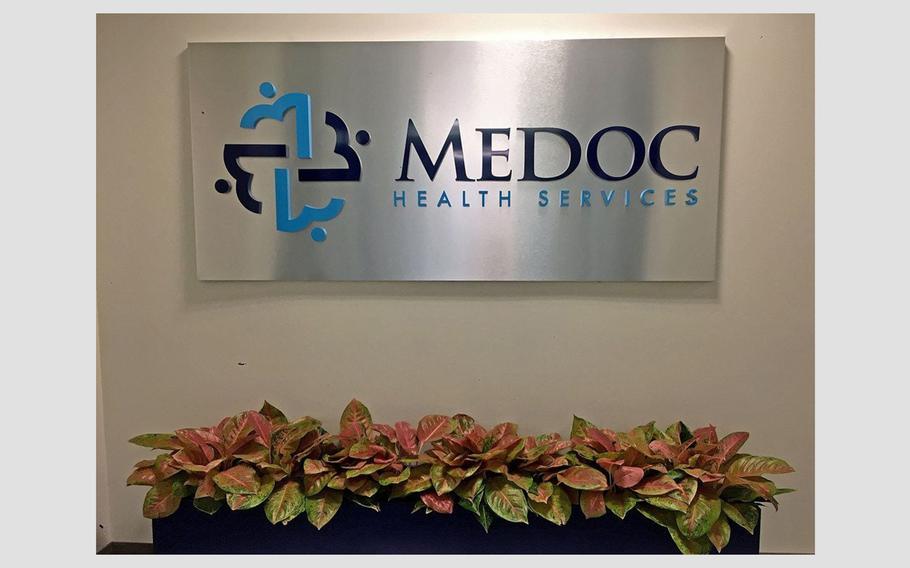
FBI agents load boxes into a van while the federal agents raid the Medoc Health Services company in Dallas on May 9, 2018. (Jae S. Lee/TNS)
(Tribune News Service) — Five years after federal agents left a northwest Dallas office building in May 2018 with boxes holding the documents of a healthcare company, five of seven defendants have pleaded guilty in a medical kickback scheme.
In addition to the guilty pleas, which included two top executives at Medoc Health Services, the government won judgments for millions of dollars in a related civil fraud lawsuit, court records show. The two remaining defendants are scheduled to go on trial next month.
Medoc’s owners are accused of bilking government healthcare programs out of about $2 million by steering prescriptions of compound pain creams and other medications to pharmacies in exchange for kickbacks. Prosecutors say some kickbacks were disguised as a salary paid to one of the defendants, Michael Schneider, a Medoc partner, who then split the money with the other defendants using shell companies.
“All of the defendants understood that the [employment] agreement was a sham designed to pay the Medoc defendants kickbacks,” government attorneys wrote in court documents.
The conspiracy focused on paying Medoc, the pharmacies and the doctors as much money as possible, prosecutors said. The interests of the patients were not the primary consideration, court records show.
The Medoc case is one of several big health care fraud prosecutions in North Texas involving compounded pain creams, which for a time provided pharmacies and doctors with a lucrative income. The compounded medications appeared on the market several years ago in response to the nation’s opioid crisis, ostensibly as a safe alternative treatment for chronic pain. But fraud was endemic in the industry, and cases across Texas and the nation continue to result in convictions.
The latest guilty pleas, which strengthened the government’s case against Medoc, came from Kevin Kuykendall, its chief executive, and Sabrina Kuykendall, his wife and Medoc’s vice president of finance. The Kuykendalls pleaded guilty earlier this month to conspiracy to solicit and receive kickbacks, which comes with a maximum penalty of five years in prison.
Kevin Kuykendall’s plea deal calls for an agreed sentence of three years in federal prison, court records show. His wife’s agreed sentence is 36 months probation, records show. Their attorneys could not be reached for comment.
The Kuykendalls owe at least $4.4 million in restitution as part of their plea agreements, court records show. They are scheduled to be sentenced in February by U.S. District Judge Brantley Starr in Dallas.
Trial for Michael Schneider and another defendant — his brother, Mark Schneider — is scheduled for Dec. 4. Their attorneys either declined to comment or could not be reached.
All of the defendants were released from custody after the 2020 indictment.
The government also is suing all seven defendants and Medoc in a related civil fraud lawsuit stemming from a whistleblower claim. The whistle-blower, Mark Adams, filed his lawsuit against Medoc in October 2017, and the government agreed to join it and take the lead in July 2019. The U.S. attorney’s office filed a 115-page civil complaint against Medoc, its partners and others, alleging violations of the federal False Claims Act, fraud and “unjust enrichment.”
The Kuykendalls and Schneiders were charged with seven counts of soliciting and receiving kickbacks. The indictment’s allegations are almost identical to those in the civil whistle-blower lawsuit.
The Medoc owners steered prescriptions of compound pain creams and other medications to three North Texas pharmacies in exchange for kickbacks from January 2015 through August 2016, the indictment says. The compounding pharmacies paid kickbacks to Medoc from earnings they received from Medicare, Tricare (the military’s health plan) and Department of Labor insurance programs, federal authorities allege.
Two of the pharmacies — Total RX Care and Midcities Pharmacy — signed “sham employment agreements” with Michael Schneider in order to use his supposed salary to hide the kickbacks, authorities allege. A third pharmacy, Doctors Specialty Pharmacy, also paid kickbacks to Medoc, the government’s lawsuit says.
The doctors
Kevin Kuykendall, 59, and Mark Schneider in January 2015 founded Medoc, which “entered into relationships with doctors who prescribed various medications, often compound pain creams,” according to Kuykendall’s plea filing.

Federal agents raided Medoc Health Services in Dallas in 2018. (Jae S. Lee/TNS)
Medoc created more than 20 subsidiaries co-owned by small groups of physician-investors, the government’s lawsuit said. Medoc paid the doctors based on the number of patient referrals they sent to Medoc, according to government lawyers. Medoc then sent the prescriptions to “pharmacies of its choosing” to be filled.
“Medoc’s objective was to generate [patient] referrals to pharmacies for pain creams, metabolic supplements, and other products with high reimbursement rates — as high as tens of thousands of dollars for some products,” the federal lawsuit said. “The Medoc defendants created a network of physicians that they could and did pressure for referrals.”
Medoc rewarded doctors who wrote the most prescriptions with higher payments while those with a lower volume were either cut off or given lower payments, the lawsuit said.
Kevin Kuykendall sent an email in May 2015 in which he addressed under-performing doctors.
“He’s a great guy but not a huge scripter at this point,” he allegedly wrote about one doctor. “However, he could be, if mentored.”
Medoc prepared pre-printed prescription pads for the doctors with preferred “scripts” for topical creams like pain and scar creams as well as other products with high reimbursements rates, the federal lawsuit says. Doctors were urged to write prescriptions for their patients based on “what paid the most—rather than simply on the patients’ needs,” authorities allege.
That resulted in higher payments to the doctors and Medoc, according to the federal lawsuit. The scheme also prevented patients from using their regular pharmacy.
“By limiting the patients’ choice, Medoc was in a position to extract commissions from pharmacies,” the federal lawsuit said.
Medoc patients received packages with various pain creams and lotions in the mail. After receiving multiple shipments, one patient called a Medoc-connected pharmacy and told them to stop sending the creams, court records show. The patient was told the medication had to be sent because the doctor prescribed it, according to court filings.
One patient “got so many packages of pain creams, they needed to be stored in the garage,” the federal lawsuit said.
Court documents do not say what civil or criminal actions, if any, were taken against the prescribing doctors. The U.S. attorney’s office in Dallas declined to comment.
Guilty pleas
Also charged in the scheme were Trenton Moody, a Medoc partner; Moky Cheung, Medoc’s chief information officer; and Cuong “Michael” Nguyen, a licensed pharmacist who was Total RX’s president and chief executive.
All three men pleaded guilty early in the proceedings.
Cheung and Nguyen are awaiting sentencing. Moody, 44, served his year-long sentence and was released from prison. He could not be reached for comment.
Total RX was struggling financially prior to joining the Medoc conspiracy, court records show. Mark Schneider and Kevin Kuykendall told Nguyen they had developed relationships with physicians and could generate “substantial” prescription referrals for his Rowlett pharmacy.
They did not exaggerate.
“Physician referrals immediately started pouring into the pharmacy,” government lawyers said in court documents. “These compounding prescriptions soon represented almost all of Total RX’s business.”
Nguyen, 48, admitted in his plea papers that Total RX’s relationship with Medoc became “lucrative.”
Cheung, 43, said in his plea documents that the Michael Schneider employment agreement with Total RX was a way to “paper up” the illegal kickback scheme. His attorney could not be reached for comment. Cheung owes $300,000 in a civil judgment.
Nguyen said in plea documents that in order to continue running his Total RX pharmacy, he agreed to turn over 50% of it to a company that was run by the same people who ran Medoc.
Nguyen agreed to a $2.2 judgment against him, court records show. His attorney could not be reached.
©2023 The Dallas Morning News.
Visit dallasnews.com
Distributed by Tribune Content Agency, LLC.